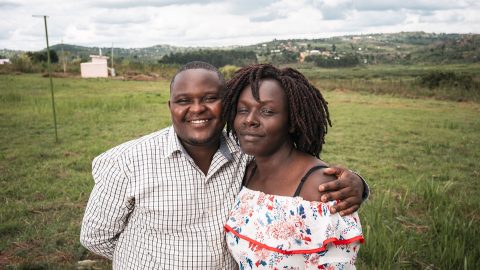10 + 1 facts about forgotten crises
Conflicts, natural disasters, famines, and economic disasters – sooner or later, crisis like these drop from the headlines and the lips of politicians, but they continue to be an acute reality for the people on the ground. When we talk about forgotten and neglected crises, what do we mean?
1. NO CRISIS IS EVER TRULY FORGOTTEN.
That is why we prefer to talk about neglected crises. Being privileged individuals, we may often forget about individual crises; as such crises do not affect us directly and thus do not require our constant attention. These crises can better be described as neglected – by the international community, which may either be unable to respond with sufficient money, or even find the required political willpower.
2. CRISES ARE OFTEN COMPLICATED.
Conflicts between two states are easy to grasp, as are natural catastrophes. But many other crises have multifaceted reasons – the Syrian conflict, for instance, began after a climate-change-caused dry period and cannot be reduced to a mere geopolitical, historical, and ideological squabble. Events that we find hard to understand are also difficult to follow and identify with.
3. CRISES DO NOT HAVE QUICK ENDINGS.
The recovery period is a part of the crisis. Peace treaties are signed, typhoons die down, but these things still do not mean the crisis itself is over. Rebuilding infrastructure, institutions and citizenship takes a long time and requires a lot of resources, whether it is war or a natural catastrophe.
4. FORGETTING IS UNDERSTANDABLE.
An individual person cannot carry the weight of the world on their shoulders, especially if they also are facing issues in their personal lives. Continuous obsessive monitoring of media – doomscrolling – benefits nobody. We often see compassion fatigue – a situation where the sheer burden handicaps or short-circuits our feelings of compassion, particularly when there is no solution in sight.
5. MORE NEWS, FASTER FORGETTING.
There’s not enough room for many crises in the news at the same time. Also at play are geographical and cultural relationships, which have their effect on what the news finds important. It is easy for Finns to pay attention to the Ukrainian crisis, for example – the attacker is familiar to the people of Finland and is also Finland’s neighbor. Continuous access to news means that existing crises are buried by new ones. Moreover, instead of civilian suffering, the news often finds battles and political squabbles more important.
6. WHO BELIEVES WHOM?
The Internet offers more information about various crises than ever before – and a wealth of differing viewpoints. An enormous amount of information is swirling about online and when crises have complicated and far-reaching reasons, it is all too easy to assume simple, even false points of view and fake news. All of this affects the way we view these crises and their potential solutions.
7. THE LACK OF POLITICAL WILL IS BOTH A REASON AND A CONSEQUENCE.
Politicians, parties, and the international community may, due to their lack of ability or will to act, be unable to solve or prevent certain crises, and this may also serve as a reason for them to not pay attention to certain crises. On the other hand, if people do not demand actions from their leaders, the resulting political apathy may also be a factor in the low amount of attention the crisis receives.
8. LOW LEVELS OF ATTENTION, LOW LEVELS OR AID.
Enormous crises, like the tsunami in Asia or Russia’s attack on Ukraine, bring aid organizations vast amounts of funds from private individuals and organizations. Which is good! Getting aid without media attention is always more of a chore, though. Traditional funders still understand the importance of long-term aid work, but even established actors like the World Food Programme and the UN Refugee Agency have troublecollecting the funds they need for their work.
9. BEING FORGOTTEN INCREASES HOPELESSNESS.
Those living in the middle of long-lasting conflicts may feel abandoned and isolated, if the international community ignores their problems. This lack of vision and feelings of hopelessness then provide grist for extremist mills. Hope and belief in one’s future are important – through these, people and communities have, throughout history, managed to survive various awful crises.
10. THE SCALE OF THE ENVIRONMENTAL CATASTROPHE IS DIZZYING.
The climate catastrophe and nature loss will cause natural disasters, weaken food security, and drive refugees and armed conflicts far to the future. The scale of changes is enormous, but the effects are distributed unequally and there are considerable differences in the level of community preparations and available resources. This is hardly a new situation, however: in the 2010s, over 80 percent of all catastrophes were related to climate and weather. One way or another, this crisis is showing up in everyone’s backyard. We cannot ignore it any longer.
10+1. THROUGH FCA, WE CAN PREPARE AND GROW STRONGER.
FCA’s work is not over even when the most acute part of the crisis is. The organization also helps prepare for coming crises and prevent them in advance. Additionally, FCA collaborates with communities to strengthen their ability to prepare and survive by searching for nature-based solutions and innovating to always be a little bit better. FCA also works in crisis areas with its partner organizations.
For this story, we interviewed FCA’s humanitarian aid manager Jan De Waegemaeker and political history researcher Noora Kotilainen, a communication, crisis, and political violence expert at the University of Helsinki. Additional sources include materials drawn up by the Norwegian Refugee Council on forgotten refugee crises and the World Disasters Report.
Teksti: Anne Salomäki
Kuvitus: Carla Ladau
Translation: Tatu Ahponen





